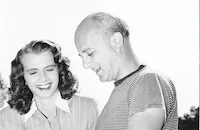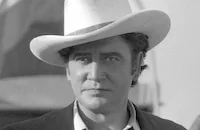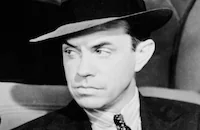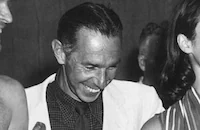Blind Alibi

Brief Synopsis
Cast & Crew
Lew Landers
Richard Dix
Whitney Bourne
Eduardo Ciannelli
Frances Mercer
Paul Guilfoyle
Film Details
Technical Specs

Synopsis
To save her husband's career, Ellen, the American wife of a prominent Parisian politician, asks her brother, sculptor Paul Dover, to retrieve a packet of her love letters from the blackmailing criminal Marlow. With his neighbor Marcel, a professional safecracker, Paul breaks into Marlow's office and steals the letters, which Ellen had written to Marlow as a naive university student, from a safe. As Marcel is escaping from the office, however, he is shot by one of Marlow's men and dumps the letters in an alleyway. Although Marlow, who has forced a confession out of Marcel, is arrested, Paul decides to track down the letters, which have ended up in a shipment bound for a museum in Los Angeles. Once in Los Angeles, Paul assumes the disguise of a blind man, buying Ace, a Seeing Eye dog, and ingratiating himself with Julia Fraser, the assistant curator of the museum, who, out of compassion, grants him permission to study all of the exhibits. At the same time, Mitch, a Los Angeles cohort of Marlow, murders a museum janitor and plants one of his men, Taggart, in the vacated position. When Taggart is unable to infiltrate the collection, he suggests to Mitch that they hire Paul, who agrees to do the job. After convincing the police of his blindness, Paul learns that the letters have been moved to Julia's desk. With Ace at his side, Paul, who has confessed his impersonation to Julia, breaks into the museum and burns the letters before Mitch and his gang arrive. As Paul leaves the museum, however, he is caught by Mitch, and during the ensuing struggle, Ace suffers a sight-threatening gunshot wound. Although Mitch is captured by the police, Paul is arrested for stealing the letters after he delivers Ace to a veterinarian. Paul serves his year-long prison sentence and is released to the loving, faithful arms of Julia and a recuperated Ace.

Director

Lew Landers
Cast

Richard Dix
Whitney Bourne

Eduardo Ciannelli

Frances Mercer

Paul Guilfoyle

Richard Lane

Jack Arnold

Walter Miller
Frank M. Thomas
Solly Ward

George Irving
Ace, The Wonder Dog
Tommy Bupp
Crew
Ted Cheesman
William Joyce Cowan
Edward Donohue
Ron Ferguson
Al Herman
Lionel Houser
Nicholas Musuraca
Van Nest Polglase
Cliff Reid
Renié
Harry Segall
Earl A. Wolcott

Film Details
Technical Specs

Articles
Blind Alibi -
By Richard Harland Smith

Blind Alibi -
Quotes
Trivia
Notes
The screenplay for this film was adapted from William Joyce Cowan's unpublished story, "The Seeing Eye." Richard Dix returned to RKO to act in this movie after a two-year absence from the studio. Although Hollywood Reporter announced that Blind Alibi was to be the first of four RKO pictures starring Dix and produced by Cliff Reid, Reid only produced one of the four. According to Motion Picture Herald's "In the Cutting Room," Lightning, not Ace, the Wonder Dog, was to appear in the film. The Motion Picture Herald review erroneously lists Lightning in the cast. Motion Picture Herald's "In the Cutting Room" and Hollywood Reporter news items add George Davis, Gladden James, William Gould, Lew Carter, Clyde Wilson, Pat O'Malley, Monte Montague, Robert Homans, Lew Phelps and Richard Parker to the cast, but their participation in the final film has not been confirmed.














